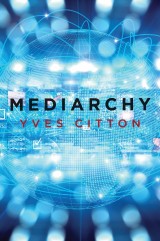Details
Mediarchy
1. Aufl.
|
19,99 € |
|
| Verlag: | Wiley |
| Format: | EPUB |
| Veröffentl.: | 11.11.2019 |
| ISBN/EAN: | 9781509533411 |
| Sprache: | englisch |
| Anzahl Seiten: | 308 |
DRM-geschütztes eBook, Sie benötigen z.B. Adobe Digital Editions und eine Adobe ID zum Lesen.
Beschreibungen
<p>We think that we live in democracies: in fact, we live in mediarchies. Our political regimes are based less on nations or citizens than on audiences shaped by the media. We assume that our social and political destinies are shaped by the will of the people without realizing that ‘the people’ are always produced, both as individuals and as aggregates, by the media: we are all embedded in mediated publics, ‘intra-structured’ by the apparatuses of communication that govern our interactions. <br /> <br /> In this major book, Yves Citton maps out the new regime of experience, media and power that he designates by the term ‘mediarchy’. To understand mediarchy, we need to look both at the effects that the media have on us and also at the new forms of being and experience that they induce in us. We can never entirely escape from the effects of the mediarchies that operate through us but by becoming more aware of their conditioning, we can develop the new forms of political analysis and practice which are essential if we are to rise to the unprecedented challenges of our time. <br /> <br /> This comprehensive and far-reaching book will be essential reading for students and scholars in media and communications, politics and sociology, and it will be of great interest to anyone concerned about the multiple and complex ways that the media – from newspapers and TV to social media and the internet – shape our social, political and personal lives today.</p>
Contents<br /> Prelude: Democracy or mediarchy? <br /> <br /> PART ONE: MEDIA <br /> Chapter One: Naming mediarchy<br /> Interlude One: Heterarchy <br /> Chapter Two: Approaching mediarchy<br /> Interlude Two: Informational pharmacology <br /> Chapter Three: Unfolding mediarchy <br /> Interlude Three: Affective meteorologies <br /> Chapter Four: Equipping mediarchy <br /> <br /> PART TWO: MASS MEDIA <br /> Chapter Five: Massifying mediarchy <br /> Interlude: Populisms <br /> Chapter Six: Systematizing mediarchy<br /> Interlude Five: Media powers<br /> Chapter Seven: Decolonizing mediarchy <br /> <br /> PART THREE: MEDIUM <br /> Chapter Eight: Archaeologizing mediarchy<br /> Interlude: Accelerationisms <br /> Chapter Nine: Stratifying mediarchy <br /> The politics of low frequencies<br /> Chapter Ten: Magnetizing mediarchy<br /> Interlude: Formative milieus <br /> Chapter Eleven: Zombifying mediarchy<br /> <br /> PART FOUR: META-MEDIA<br /> Chapter Twelve: Digitizing mediarchy<br /> Interlude: Data commons <br /> Chapter Thirteen: Inhabiting mediarchy <br /> Interlude: Mediarchic metamorphoses <br /> Chapter Fourteen: Surprising mediarchy<br /> <br /> Postlude: Medianarchism? <br /> List of illustrations <br /> Notes
<p>‘<i>Mediarchy</i> is a magnificent work of synthesis that brings together many different approaches to media. Citton boldly puts the analysis of media at the centre of social thought and shows just how many of the things we observe about our times fall into place through this perspective.’<br /><b>McKenzie Wark, New School for Social Research </b></p> <p>‘Grounded and creative, this book proposes a timely synthesis of recent media theory. Citton questions the “transcontinental divide” that has informed Media Studies from its onset and in the process manages to breathe new life into some of the most fundamental questions facing media critics today. <i>Mediarchy</i> is a must read for anyone interested in understanding the complex, multitiered operationality of media in our modern world.’<br /><b>Mark Hansen, Duke University<br /><br /></b>"a rich and thought-provoking book"<br /><b><i>European Journal of Communication</i><br /></b></p>
<b>Yves Citton</b> is Professor in Literature and Media at the University Paris 8 Vincennes-Saint Denis, co-editor of the journal <i>Multitudes</i>, and director of the ArTeC Graduate School in Paris.



















